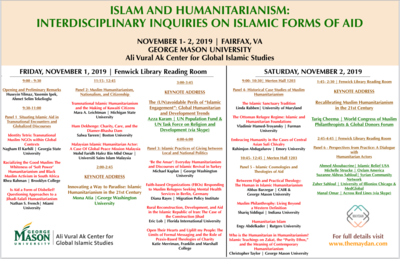Thursday, February 28, 2019 1:30 PM to 2:30 PM EST
Enterprise Hall, 318
Professor Sachedina will discuss his current research on juridical ethics in Islam. He argues that In the field of Islamic Studies thus far, the reference to Islamic ethics have been in the area of virtue ethics as inherited from Aristotelian ethics. The general perception among Western scholars is that Muslim scholarship is too legalistic and it has ignored ethics. Since the Muslim scriptures regard moral behavior and character ethics to be an essential part of faith in God, we need to search for the ethical foundations of Interpretive Jurisprudence (al-fiqh), to underscore the fact that no legal decisions could have been made without due regard to the moral philosophy of the Qur’an and Hadith in Islam. Abdulaziz Sachedina, Ph.D., is Chair and Professor in the Department of Religious Studies and IIIT Chair in Islamic Studies at George Mason University in Fairfax, Virginia. Dr. Sachedina has studied in India, Iraq, Iran, and Canada and obtained his Ph.D. from the University of Toronto. He has been conducting research and writing in the field of Islamic Law, Ethics, and Theology (Sunni and Shiite) for more than two decades. In the last ten years he has concentrated on social and political ethics, including Interfaith and Intrafaith Relations, Islamic Biomedical Ethics and Islam and Human Rights. Dr. Sachedina’s publications include: Islamic Messianism (State University of New York, 1980); Human Rights and the Conflicts of Culture, co-authored (University of South Carolina, 1988) The Just Ruler in Shiite Islam (Oxford University Press, 1988); The Prolegomena to the Qur’an (Oxford University Press, 1998), The Islamic Roots of Democratic Pluralism (Oxford University Press, 2002), Islamic Biomedical Ethics: Theory and Application(Oxford University Press, February 2009), Islam and the Challenge of Human Rights (Oxford University Press, September 2009), in addition to numerous articles in academic journals. He is an American citizen born in Tanzania.





